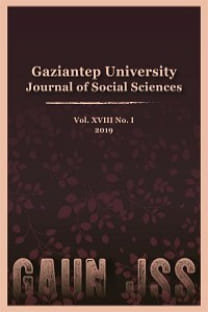Shakespeare’in Dört Temel Tragedyasındaki Kötü Karakterlerin Machiavelli Prensipleri Açısından Değerlendirilmesi
Machiavelli, The Prince, Machiavelli tarzı karakter, Shakespeare trajedisi, kötü karakterler.
An Evaluation of the Evil Characters in Shakespeare’s Four Principle Tragedies in terms of Machiavellian Principles
Machiavelli, The Prince, Machiavellian character, Shakespearean tragedy, evil characters.,
___
- Grady, H. (2002). Shakespeare, Machiavelli, and Montaigne: Power and Subjectivity From Richard II to Hamlet. New York: Oxford University Press Inc.
- Harbage, A. (1964). Shakespeare: The tragedies. Eaglewood Cliffs: Prentice Hall.
- Hazlitt, W. (2009). Characters of Shakespeare’s plays. J. H. Lobban (Ed.). Cambridge: Cambridge University Press.
- Heilman, R. B. (1956). Magic in the web. Lexington: University Press of Kentucky.
- Machiavelli, N. (2009). The Prince. Trans. Marriot W. K. Toronto: Prohyptikon Publishing Inc.
- Meyer, E. (1897). Machiavelli and the Elizabethan drama. Weimar: Verlag Von Emil Felber.
- Raab, F. (1964). The English face of Machiavelli. Toronto: University of Toronto Press.
- Raatzsch, R. (2009). The Apologetics of evil: The Case of Iago. Princeton and Oxford: Princeton University Press.
- Roe, J. (2002). Shakespeare and Machiavelli. Cambridge: D. S. Brewer.
- Shakespeare, W. (2012a). Hamlet. İstanbul: Dejavu Publishing.
- ---. (2010). King Lear. İstanbul: Dejavu Publishing.
- ---. (2011). Macbeth. İstanbul: Dejavu Publishing.
- ---. (2012b). Othello. İstanbul: Dejavu Publishing.
- Skinner, Q. (2000). Machiavelli: A very short introduction. Oxford: Oxford University Press.
- Spivack, B. (1964). Iago Revisited. In Alfred Herbage (Ed.), Shakespeare: The Tragedies. Englewood Cliffs: Prentice Hall.
- ISSN: 1303-0094
- Yayın Aralığı: 4
- Başlangıç: 1991
- Yayıncı: Gaziantep Üniv. Sosyal Bilimler Enst.
Türkiye’de Turizm Coğrafyası Araştırmalarında Disipliner İlişkinin Sosyal Ağ Analizi ile İncelenmesi
İsmail KERVANKIRAN, Fatma SERT ETEMAN, Ayşe ŞARDAĞ
Türkiye’de İhracat, İthalat ve Ekonomik Büyüme İlişkisi: ARDL Sınır Testi Yaklaşımı
Akıllı Kent: Öğreten Kentlerden Öğrenen Kentlilere
The Neccessity of Externalization of Costs of Syrian Refugees (The Case of Turkey)
Hacı Mustafa PAKSOY, Gümrah Can BAŞDAĞ
HALİDE EDİB’İN “HAMLET”İ: İNGİLİZ EDEBİYATI SEMİNER MESAİSİNDEN SHAKESPEARE KÜLLİYATI
Kazuo Ishiguro’nun Günden Kalanlar Romanında Anlatı Güvenilmezliğinin İmaları
